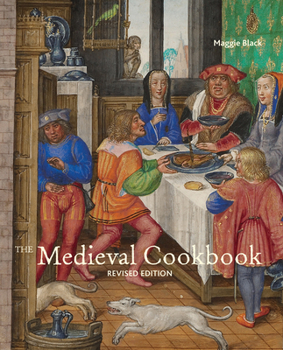The Medieval Cookbook
Select Format
Select Condition 
Book Overview
A colourful cookbook with a selection of eighty recipes drawn from medieval sources and adapted for the modern cook. Extensively illustrated with scenes from medieval life, the dishes reflect the food... This description may be from another edition of this product.
Format:Hardcover
Language:English
ISBN:1606061097
ISBN13:9781606061091
Release Date:May 2012
Publisher:J. Paul Getty Museum
Length:144 Pages
Weight:1.40 lbs.
Dimensions:0.7" x 7.2" x 9.0"
Customer Reviews
5 ratings
Wonderful!
Published by Thriftbooks.com User , 19 years ago
As a medieval historian and living history enthusiast, this book was everything I'd hoped it would be. Not only are there authentic recipes, but actual recipes reprinted from the original sources. It's great to read a 14th century Italian recipe for soup in the chef's origianl recipe. It also contains general info about types of dishes and other things like that for the non-historians out there. It's a lot of fun, and is organized just as any modern cookbook is, which is one of the best things about it.
Very Good History and Illustrations. Weaker on Recipes.
Published by Thriftbooks.com User , 20 years ago
`The Medieval Cookbook' by Maggie Black is very similar to the slightly older book, `Pleyn Delit' by Constance B. Hieatt, Brenda Hosington, and Sharon Butler. It even cites this book and other works by these authors as references. Aside from the fact that the two books deal with almost exactly the same subject, English and French recipes from the late Middle Ages, and both are serious, scholarly works, there are two important differences. The positive differences in Ms. Black's book is that it is organized by source and that it has many more pictures, both black and white and color photographs of scenes from medieval sources, and line drawings or etchings of food plants and other botanicals. `Pleyn Delit' has virtually no pictures. The two books share several major sources. Dominating the sources and background of both books is Geoffrey Chaucer's `Canterbury Tales'. While this work contains no recipes itself, if has numerous references to food and beverages, and Ms. Black devotes an entire chapter to recipes cited in this great literary work. The second major work cited in Ms. Black's volume is a pedagogical volume by an upper middle class member of the gentry identified as `The Goodman of Paris'. The narrative identifies him as probably a civil servant, with houses in both the city and the country. After chapters on proper moral deportment, the author gives both menus and recipes for the training of his staff of servants. The book also gives several directions to wife and staff on proper kitchen economics and the care of domestic and captured animals. The third primary source is documents associated with the very sybaritic court of the English king Richard II, whose death started the War of the Roses. I am green with envy at my image of the author's working on this book among the stacks of Oxford's Bodleian Library and at the British Museum, two shrines of English language scholarship for sure. I have seen both as a tourist and my most persistent fantasy career is one of a scholar. The pictures in the book are very well chosen to illustrate the literary sources. Pictures of medieval life are taken largely from tapestries such as the famous Bayeux tapestry and similar sources. They are very well selected and, unlike so many other incidental pictures in books on cookery, they are actually given meaningful captions. Ms. Black and the authors of `Pleyn Delit' take almost exactly the same approach to translating their recipes from old English and identifying the sources of the original text. The recipe translations are equally fine in both books while the scholarly method of citing sources is equally dismal. I simply do not understand these authors use of a plainly obscure method for connecting source in the bibliography to the text in the main part of the book. I am certain these Brits and Canadians use the same scholarly conventions as we Yanks as codified in things like the `Chicago Manual of Style'. This little quibble is for the scholars am
Beautiful
Published by Thriftbooks.com User , 23 years ago
This is a beautifully presented book and can give you clear and informative advice. The layout of the recipes can be a little clumsy but this is forgiven once you start using it. She references the recipes which is very good from a research point of view and the pictures inside inspire and delight. Only one thing could be improved and that's a recipe index at the front-but I'm probably just being picky.
Terrific book, well-organized, amazing illustrations -
Published by Thriftbooks.com User , 25 years ago
If you're a beginner in historical cooking (like me!), then this is a wonderful introduction into medieval recipes. An awe-inspiring selection of illustrations, a common-sense approach to modernization (availability of ingredients is often an issue), and a thoroughly readable writing style make this one of my favorite cookbooks.
Good overview of Medieval practices of food.
Published by Thriftbooks.com User , 27 years ago
This book is nicely organized in how it takes its focus from different Medieval Figures such as: Chaucer, Richard II, and The Goodman of Paris. I like the general overview of some of the cooking habits during the different time periods, but found myself wanting more information than provided. As for the recipes, I liked that she included the orignal text of the recipes along with her modernization. However, I found that many of the recipes were significantly changed from the original. I feel this does a disservice to the original, for you won't get the same tastes as were intended. Some of her modernizations include ingredients that are not mentioned in the original.






